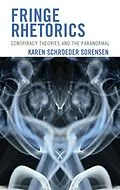Fringe Rhetorics: Conspiracy Theories and the Paranormal identifies the rhetorical similarities of conspiracy theories and paranormal accounts by delving into rhetorical, psychosocial, and political science research. Identifying something as "fringe" indicates its proximal placement within accepted norms of contemporary society. Both conspiracy theories and paranormal accounts dwell on these fringes and use surprisingly similar persuasive techniques. Using elements of the Aristotelian canon as well as Steve Oswald's strengthening and weakening strategies, this book establishes a pattern for the analysis of fringe rhetorics. It also applies this pattern through rhetorical analyses of several documentaries and provides suggestions for countering fringe arguments.
Autorentext
Karen Schroeder Sorensen is associate professor at Winona State University.
Klappentext
Fringe Rhetorics: Conspiracy Theories and the Paranormal identifies these rhetorical similarities of conspiracy theories and paranormal accounts by delving into rhetorical, psychosocial, and political science research. Identifying something as "fringe" indicates its proximal placement within accepted norms of contemporary society. Both conspiracy theories and paranormal accounts dwell on the fringes and both use surprisingly similar persuasive techniques. Using elements of the Aristotelian canon as well as Oswald's strengthening and weakening strategies, this book establishes a pattern for the analysis of fringe rhetorics. It also applies this pattern through rhetorical analyses of several documentaries and provides suggestions for countering fringe arguments.
Zusammenfassung
Fringe Rhetorics: Conspiracy Theories and the Paranormal identifies the rhetorical similarities of conspiracy theories and paranormal accounts by delving into rhetorical, psychosocial, and political science research. Identifying something as fringe indicates its proximal placement within accepted norms of contemporary society. Both conspiracy theories and paranormal accounts dwell on these fringes and use surprisingly similar persuasive techniques. Using elements of the Aristotelian canon as well as Steve Oswald's strengthening and weakening strategies, this book establishes a pattern for the analysis of fringe rhetorics. It also applies this pattern through rhetorical analyses of several documentaries and provides suggestions for countering fringe arguments.
Inhalt
Table of Contents
Chapter 1 Defining Fringe Rhetoric
Chapter 2 Rhetorical Lens
Chapter 3 Fringe Rhetoric: Flat Earth
Chapter 4 Fringe Rhetoric: Power and Control
Chapter 5 Fringe Rhetoric: Aliens and Cover-Ups
Chapter 6 Rhetorical Strategies for Refutation
